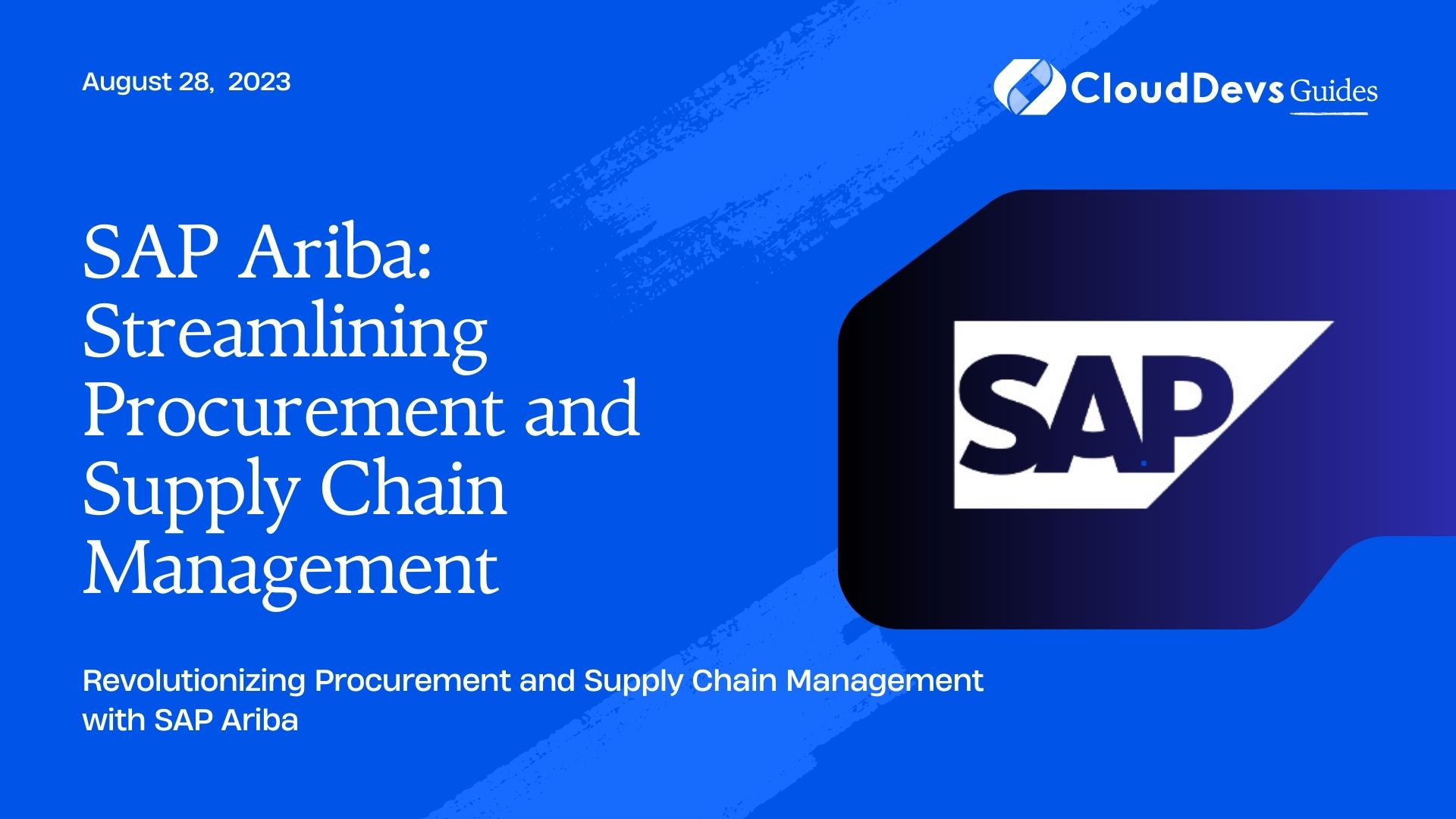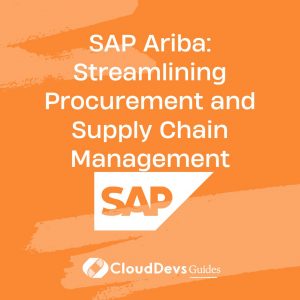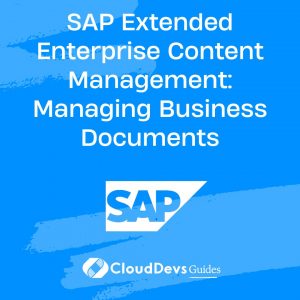SAP Ariba: Streamlining Procurement and Supply Chain Management
In today’s fast-paced business landscape, organizations are constantly seeking ways to enhance their efficiency and effectiveness across various operational domains. One critical area that has witnessed significant transformation is procurement and supply chain management. The advent of digital technology has led to the emergence of sophisticated solutions that streamline and optimize these processes. Among these, SAP Ariba stands out as a frontrunner, offering a comprehensive suite of tools and capabilities to revolutionize procurement and supply chain operations. In this blog post, we will explore how SAP Ariba is reshaping the procurement landscape, its key features, benefits, and its role in driving efficient supply chain management.
1. The Evolution of Procurement and Supply Chain Management
Historically, procurement and supply chain management have been manual and time-consuming processes. They involve activities such as supplier identification, negotiation, purchasing, order management, and invoice processing. These tasks often necessitate complex interactions among different stakeholders, both within and outside the organization. Traditional methods are susceptible to errors, delays, and lack of visibility, which can result in increased costs and operational inefficiencies.
However, with the rise of digitalization and technological advancements, these challenges are being overcome through innovative solutions like SAP Ariba.
2. Introducing SAP Ariba
SAP Ariba is a cloud-based procurement and supply chain management solution designed to simplify and automate procurement processes, enhance collaboration, and provide actionable insights for better decision-making. It offers a comprehensive suite of modules that cover various aspects of procurement, supplier management, and spend analysis. Whether you’re a small business or a global enterprise, SAP Ariba can be tailored to meet your specific needs.
2.1 Key Features and Capabilities
2.1.1 Supplier Discovery and Management:
SAP Ariba’s supplier discovery platform enables organizations to identify and onboard new suppliers seamlessly. It provides a marketplace where buyers can connect with suppliers, assess their capabilities, and make informed decisions based on reviews and ratings. Supplier management tools help track performance, compliance, and collaboration throughout the supplier lifecycle.
java // Sample code for supplier discovery API GET /api/supplier/discovery?keywords=product+services
2.1.2 Sourcing and Procurement:
The sourcing module facilitates strategic sourcing by automating the RFx process (Request for Proposal, Quotation, etc.), supplier bidding, and contract management. This reduces cycle times, promotes competitive bidding, and ensures contract compliance.
python
# Example of creating a sourcing event
POST /api/sourcing/events
{
"title": "RFQ for Office Supplies",
"description": "Request for Quotation for office stationery",
"deadline": "2023-09-30",
"items": [
{
"item_name": "Printer Paper",
"quantity": 1000,
"unit": "ream"
},
// ... other items
]
}
2.1.3 Purchase and Requisition:
SAP Ariba’s purchase module streamlines the requisition-to-order process. It enables employees to create purchase requisitions, automates approval workflows, and generates purchase orders. This ensures compliance with procurement policies and reduces maverick spending.
csharp
// Example code for creating a purchase requisition
POST /api/purchase/requisitions
{
"items": [
{
"item_code": "12345",
"quantity": 50,
"cost_center": "Marketing"
},
// ... other items
]
}
2.1.4 Invoice and Payment:
Automating the invoicing process helps prevent errors and delays. SAP Ariba allows suppliers to submit electronic invoices directly into the system, which can be matched with purchase orders and goods receipts. This accelerates the payment process and improves cash flow management.
javascript
// Sample code for submitting an electronic invoice
POST /api/invoice/submit
{
"invoice_number": "INV2023-123",
"amount": 5000.00,
"currency": "USD",
"due_date": "2023-08-15"
}
2.1.5 Analytics and Reporting:
SAP Ariba’s advanced analytics capabilities provide insights into spend patterns, supplier performance, and savings opportunities. Customizable dashboards and reports empower organizations to make data-driven decisions for continuous improvement.
sql
-- Example SQL query for spend analysis
SELECT
supplier_name,
SUM(invoice_amount) AS total_spend
FROM
invoices
GROUP BY
supplier_name
ORDER BY
total_spend DESC;
3. Transforming Supply Chain Management
Efficient supply chain management is crucial for meeting customer demands, minimizing costs, and maintaining optimal inventory levels. SAP Ariba extends its capabilities beyond procurement to streamline supply chain processes and enhance collaboration across the entire value chain.
3.1 Demand Forecasting and Planning
SAP Ariba leverages data analytics and machine learning to forecast demand accurately. By analyzing historical sales data, market trends, and external factors, organizations can anticipate fluctuations in demand and adjust their production and procurement strategies accordingly.
3.2 Inventory Management
Proper inventory management is a balancing act between having enough stock to fulfill orders and minimizing carrying costs. SAP Ariba’s inventory management tools help organizations optimize stock levels, reduce excess inventory, and prevent stockouts by triggering reorder points and automating replenishment.
3.3 Collaboration with Suppliers
Collaboration with suppliers is a critical aspect of supply chain management. SAP Ariba provides a collaborative platform where suppliers and buyers can share forecasts, production schedules, and inventory data in real time. This leads to better alignment, reduced lead times, and improved overall supply chain efficiency.
4. Benefits of SAP Ariba
4.1 Cost Savings:
By automating procurement processes, organizations can reduce manual errors, negotiate better terms with suppliers, and identify cost-saving opportunities. Real-time visibility into spending also enables informed decisions to optimize budgets.
4.2 Time Efficiency:
SAP Ariba’s automation and streamlined workflows accelerate processes such as sourcing, procurement, and invoicing. This frees up valuable time for procurement professionals to focus on strategic activities.
4.3 Supplier Collaboration:
Improved collaboration with suppliers fosters better relationships and mutual understanding. Timely communication and shared information lead to smoother transactions and quicker issue resolution.
4.4 Data-Driven Insights:
Advanced analytics provide valuable insights into spending patterns, supplier performance, and market trends. This empowers organizations to make informed decisions for continuous improvement.
4.5 Compliance and Risk Management:
SAP Ariba’s standardized processes and automated approvals ensure compliance with procurement policies and regulations. It also helps mitigate risks associated with supplier non-compliance.
Conclusion
In a rapidly evolving business environment, effective procurement and supply chain management are paramount for success. SAP Ariba’s comprehensive suite of tools and capabilities addresses the challenges posed by traditional methods, offering a streamlined, automated, and data-driven approach. By harnessing the power of technology, organizations can achieve cost savings, operational efficiency, and enhanced collaboration throughout the procurement and supply chain processes. Whether you’re a small business or a global enterprise, SAP Ariba paves the way for a more agile and competitive future.
Table of Contents









